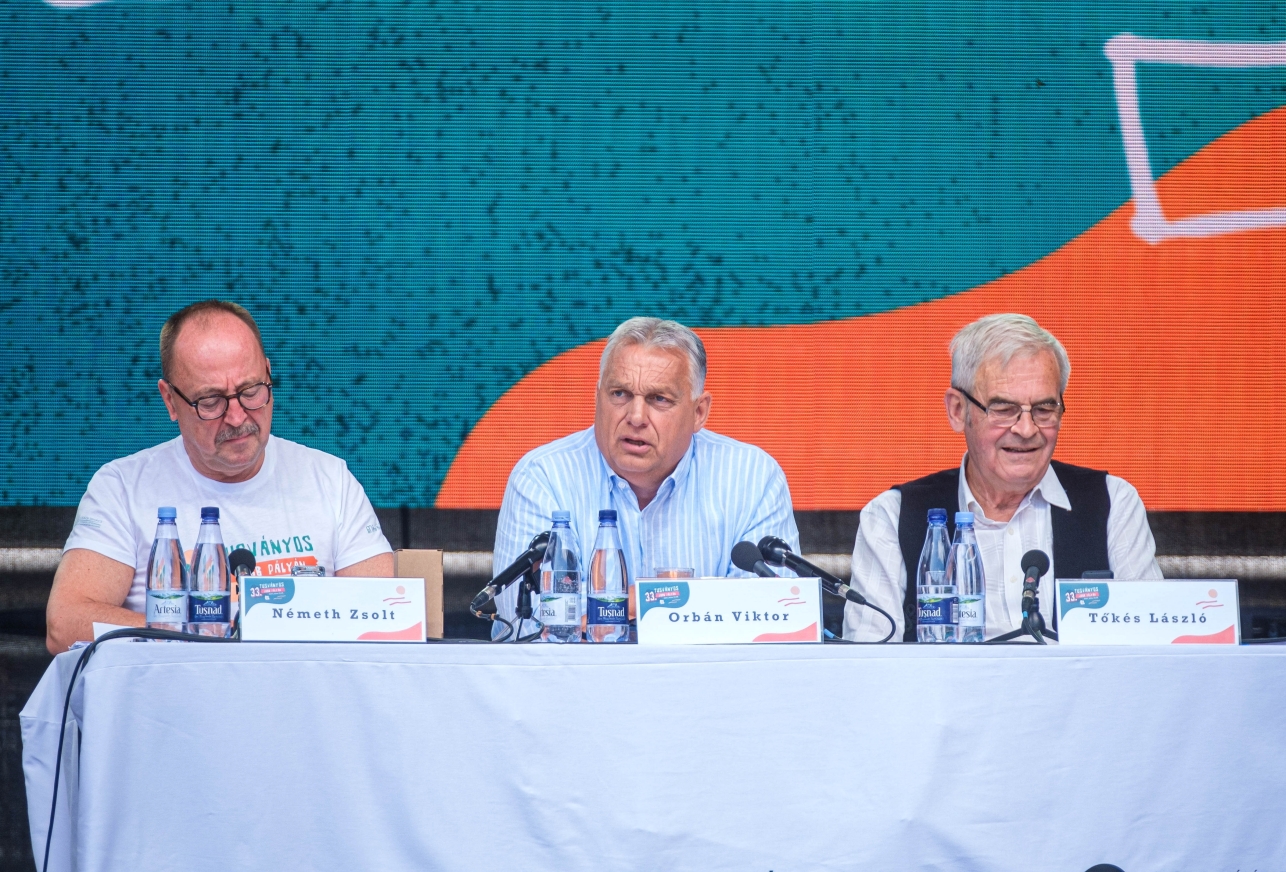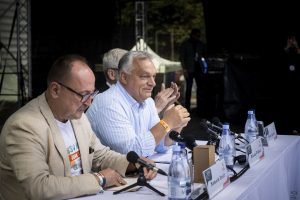
Zsolt Németh quoted a Hungarian writer saying: "Nationalism violates a right, and patriotism protects a right."Continue reading

Prime Minister Viktor Orbán delivered a compelling speech at the 33rd Tusványos Summer University in Băile Tușnad (Tusnádfürdő), advocating for Europe to adopt a peace policy and pursue independent strategies. He criticized the current European political landscape, discussed shifting global power dynamics, and emphasized the need for Europe to redefine its role in the world.
Viktor Orbán stressed the urgency for Europe to adopt a peace policy, particularly in light of the upcoming US presidential elections. He warned that if Europe did not make this shift before the elections, it would face a more challenging situation afterward.
“Trump ante portas,” (“Trump at the gates,” from Latin) he remarked, highlighting the potential impending political changes in the US. He recalled EU’s founding principle: “the aim of the Union is peace,” and criticized Brussels for pursuing what he described as a pro-war policy under the guise of promoting peace. He also noted recent international dialogues as hopeful signs of progress toward a genuine peace policy.
The Prime Minister expressed optimism about Europe transitioning from what he called a ‘pro-war to a pro-peace stance’. He explained that the ongoing conflict between Ukraine and Russia is marked by deep entrenchment and mutual belief in eventual victory. He noted,
there are two reasons for this: One is that [Russia and Ukraine] both believe they can win, and the other is that both are driven by their own real or perceived truth.”
Viktor Orbán emphasized that peace could only be achieved through external intervention since both sides are too committed to their positions to negotiate effectively. “This is a direct path to escalation,” he said, underscoring the need for an external catalyst to facilitate peace.
Mr. Orbán criticized the West for its perceived “intellectual loneliness,” suggesting that Europe had once seen itself as a global standard but is now struggling to maintain its influence. He pointed out that while the West has attempted to rally global support against Russia, many countries, including North Korea, China, Iran, India, and Türkiye, have leaned towards the side of support.
He described the current situation as a failure of European politics due to Europe’s inability to defend its own interests and its “unconditional” adherence to the United States’ Democratic Party’s policies.
The core of the European power structure had previously been the Paris-Berlin axis, which now no longer existed or was irrelevant and bypassable,”
the Hungarian PM stated, criticizing how sanctions on Russia have negatively impacted Europe’s economy and energy prices.

PM Viktor Orbán during his speech at the Tusványos Summer University. Photo: MTI / Miniszterelnöki Sajtóiroda / Fischer Zoltán
In his speech, he highlighted the significant shift in global power dynamics, predicting that Asia will become the dominant center in the future. He remarked, “Asia will be the dominant center of the world in the coming long, long decades, perhaps centuries.”
Mr. Orbán criticized the current European trajectory as one that could lead to Europe becoming an “open-air museum,” subordinated to the US and lacking developmental dynamism.
❗️@PM_ViktorOrban at Tusványos: Brussels remains under the occupation of a liberal oligarchy. It is the oligarchy that holds it in its grip. This left-liberal elite is organizing the transatlantic elite, which is not European but global, not pro-nation but federal, and not… pic.twitter.com/7vMyFXY33k
— Zoltan Kovacs (@zoltanspox) July 29, 2024
In contrast, he supported French President Emmanuel Macron’s call for strategic autonomy, which he described as a necessary step for Europe to regain its competitive edge and influence. The Prime Minister argued for major infrastructural developments, a strong European military alliance, and energy self-sufficiency to secure Europe’s future.
Poland’s Deputy Foreign Minister Władysław Teofil Bartoszewski criticized the Hungarian PM’s policies as anti-EU, anti-Ukrainian, and anti-Polish, suggesting he should leave the “Western club.”
On the other hand, some conservative voices supported Viktor Orbán’s perspective. Spanish ECR (European Conservatives and Reformists) MEP Hermann Tertsch shared Mr. Orbán’s sentiment, highlighting that
some countries in Western Europe, where European and non-European people live together, are no longer nations,”
and asserting that the true West has shifted to Central Europe.
The Hungarian Prime Minister’s speech at the Tusványos Summer University offered a critical analysis of Europe’s current political stance and its future direction. By advocating for a shift from pro-war to pro-peace policies, emphasizing the need for European independence, and forecasting a global shift in power towards Asia, Viktor Orbán set forth a vision for Europe’s role in the coming decades.
Via MTI, pap.pl, Euronews; Featured Image: MTI / Veres Nándor